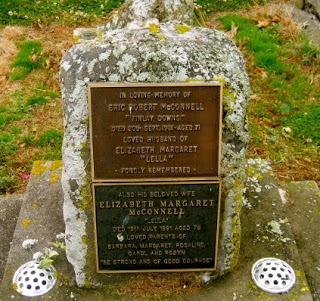Not far from where my grandparents lie in the lovely setting of St Mary’s at Esk Valley, South Canterbury is the resting place of a young Infantryman who died of wounds in Vietnam. His name is Private David Nelson Wright. I guess what is interesting about this is that unlike the many names listed just down the road on the Esk Valley War Memorial (he is not on it), David is actually buried among the community from which he came as opposed to overseas where he died as was the norm many years ago. I have always looked in on his headstone and given it a brush down if needed and wonder what his story was. As an ex Infantryman there is always the realisation now that being killed could have happened to any of us who served. I thought it was time to have a few questions about him answered. Who he was and how did he come to be buried at Esk Valley.
He died of wounds sustained in South Vietnam in 1970 (the year after I was born) at the age of 23, he was part of the 1st Battalion, Royal New Zealand Infantry Regiment and his father (who lies next to him) was the Minister of the Parish of which St Mary’s is part. That I knew from his headstone. When I have asked locals about him there was no further information known other than these details. So here is a summary of what I discovered about David Wright;
- A photo.
- He attended Christs College, Christchurch and was an accomplished sportsman.
- He was very fit and healthy.
- Like all who New Zealand soldiers who served in South Vietnam, he was a professional soldier and a volunteer.
- He was one of 37 New Zealanders to lose their life during or as a result of direct combat action in the conflict. ( A further 187 were wounded in action)
- As part of Whiskey 3 Company he arrived in South Vietnam in November 1969 for a 12 month tour of duty.
- The company was commanded by then Major Evan Torrance (who selected me for Officer Training).
- His Platoon Commander was then Lieutenant Bob Upton (Who was my first Commander upon graduation).
- He was well thought of amongst his peers and the company. I made contact with his Company Sergeant Major by e-mail and he spoke highly of David. He had never stood out for his sheer brilliance or for poor performance and had not featured in any major disciplinary breaches which from the point of view of a CSM meant he was a hard grafter who did his job and got on with it.
- He had a wicked sense of humour and innocent look about him.
- He was a “cover scout” in a rifle section which meant he was always at point and covering the lead man or ” lead scout”. This was a dangerous role that was effectively the eyes and ears of the section silently moving through the jungle. It is a role generally held by the most alert and talented soldiers who keep an eye out for mines, booby traps, hidden enemy and potential risks. Given that jungle combat is so fast and at close quarters it is not for the feint hearted.
- He never once failed his lead scout.
- He was badly wounded in a contact/gun battle with north vietnamese insurgents (Viet Cong or VC) on 30 January 1970. He was the most severely wounded (entry and exit wounds to his pelvis and upper torso) although others in his team sustained serious wounds also. You can read the full story written by those involved in this battle at this link.
- He was attended to by his mates and stabilised before being flown out of the jungle by a CASEVAC helicopter. He was more concerned about his mate George McLeod’s wounds than his own.
- Initially treated by a military hospital in Vietnam (Vung Tau Military Hospital), the nature of his wounds meant that he was transfered to an Australian hospital for further treatment.
- He initially recovered well and wrote to his mates in Vietnam this effect.
- He died of complications including a kidney infection and failure in a Sydney hospital in Australia on 19 March 1970.
- His funeral was a family affair with some military representation at Esk Valley as recalled by then Captain Ross Miller whole recalls;
“I remember going to Dave Wright’s funeral. I was, at the time, a staff officer at HQ SMD in Christchurch and although I didn’t know David, I felt that, as a Vietnam veteran, I should be there and that’s why I went. I don’t think there was large military contingent present and as I didn’t want to intrude on what was very much a family gathering I left shortly after the service.”
- His service flag was given to his mother and it hangs inside St Mary’s church at Esk Valley.
- His mother received his service medals.
- You can read a speech written and delivered by Bob Upton at the unveiling of Davids memorial at Christs College (pictured) at the link here.









